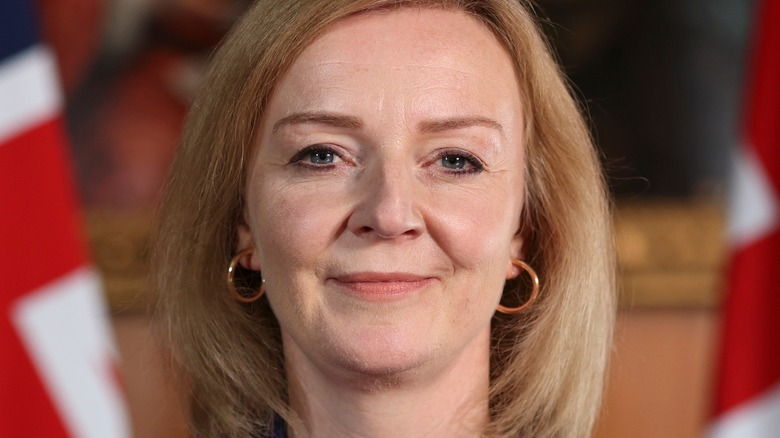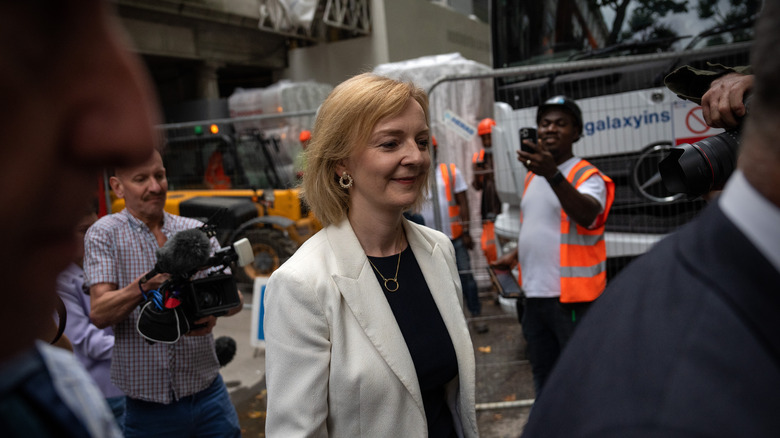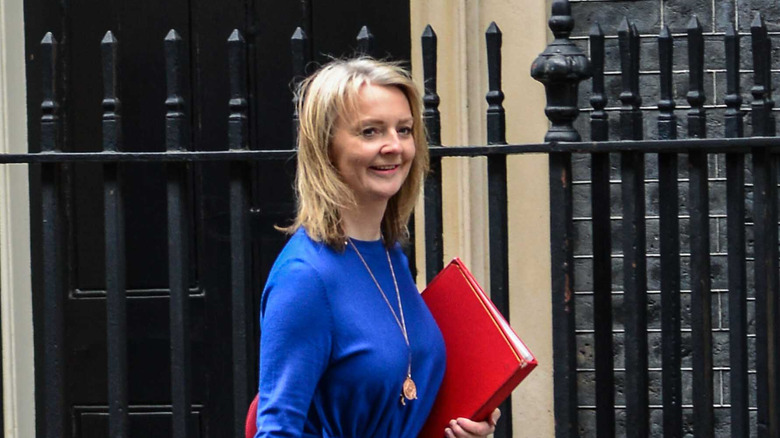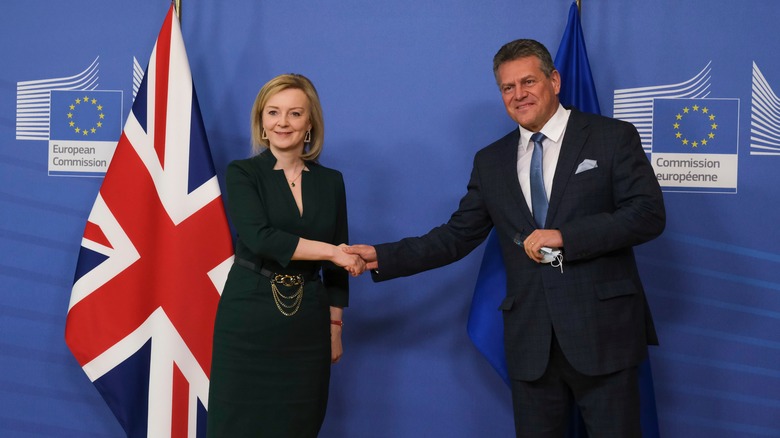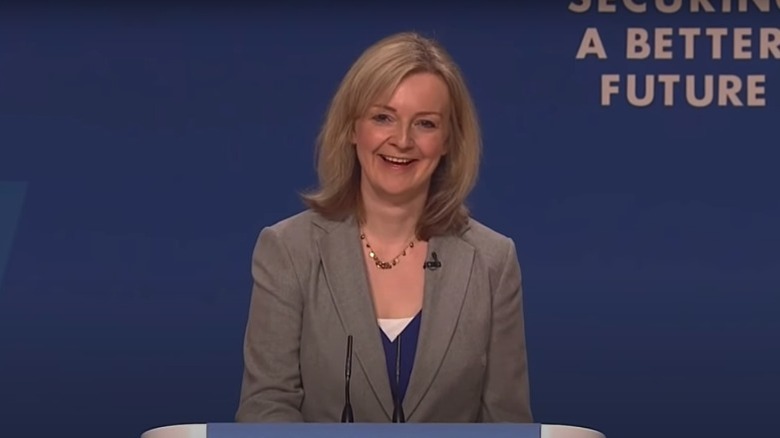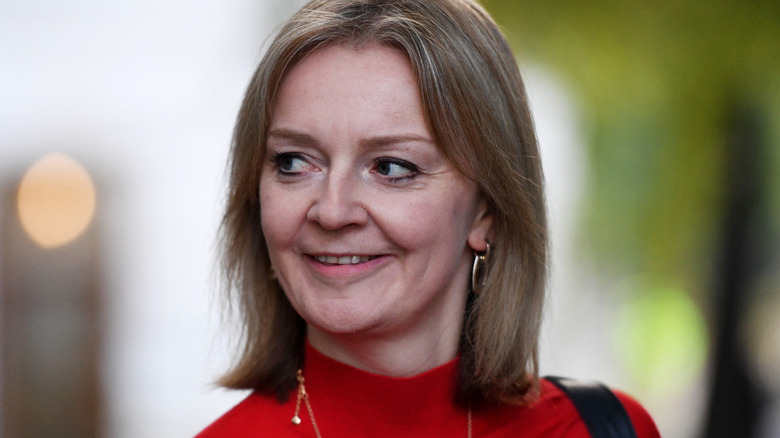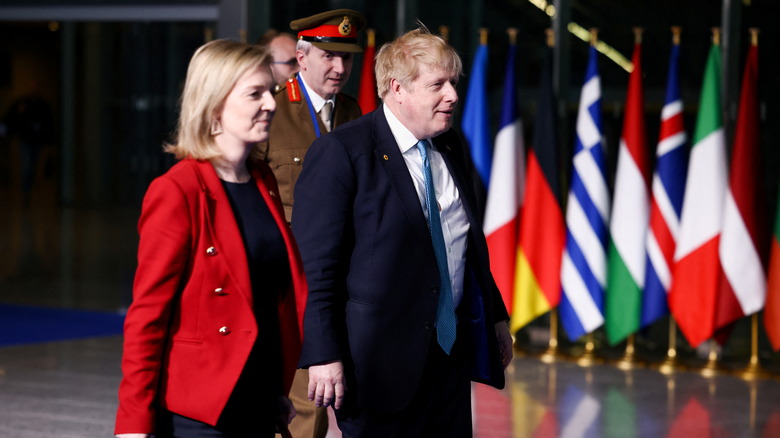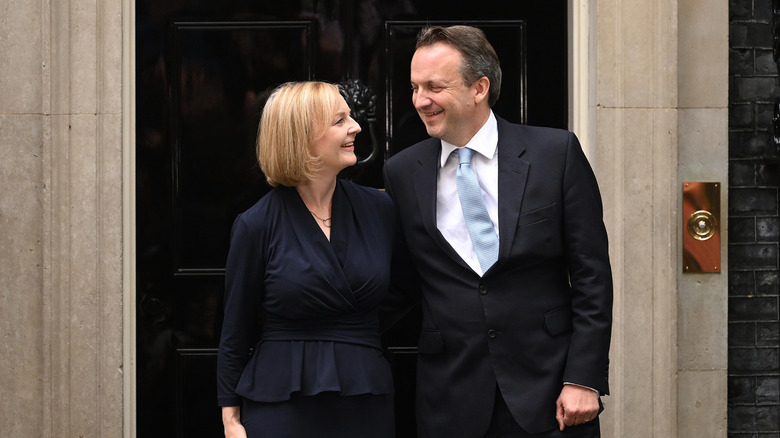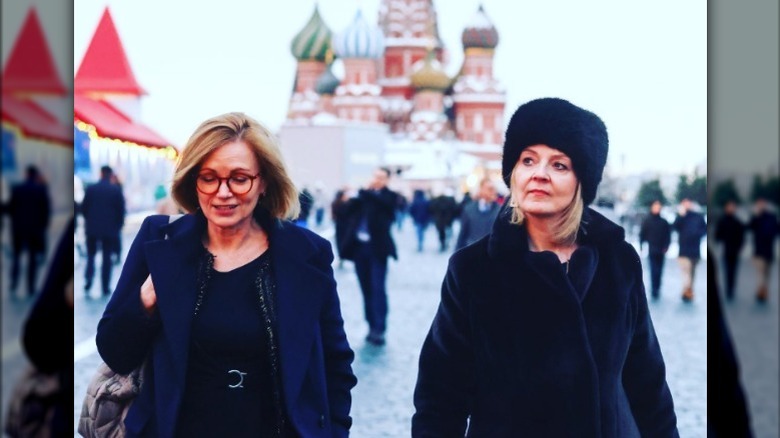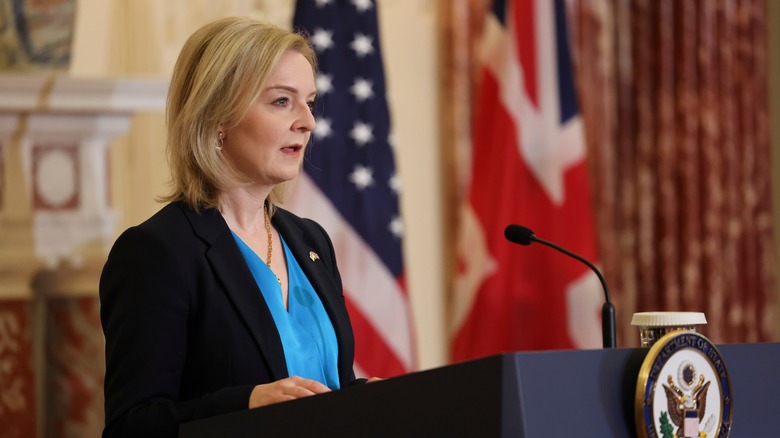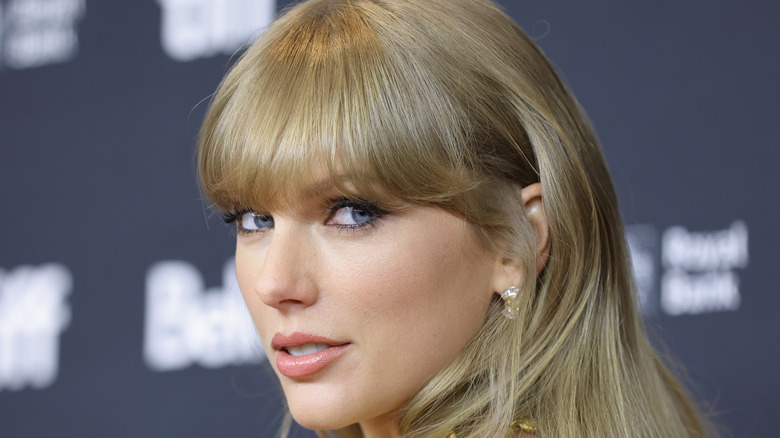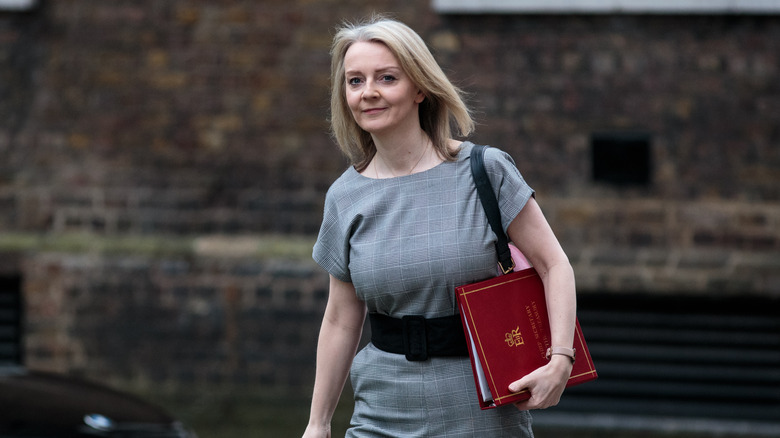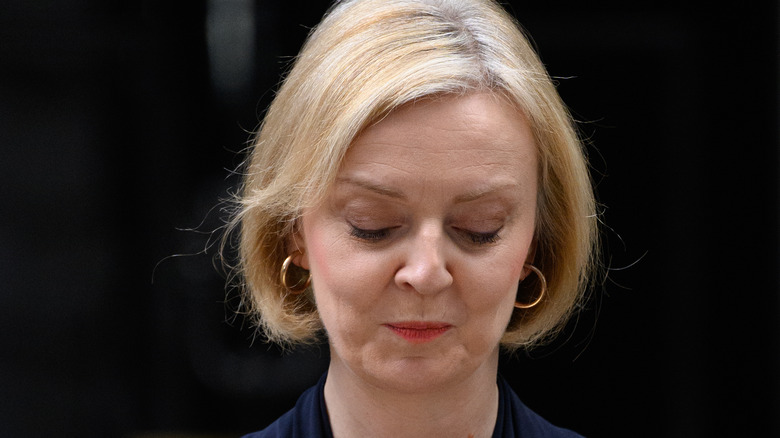Fast Facts About Liz Truss
We may receive a commission on purchases made from links.
Boris Johnson's replacement as Britain's prime minister in 2022 was, to say the least, a controversial figure, with her stint as leader barely lasting two months, after she resigned on October 20, reports The New York Times. As a liberal who converted to conservatism and a "Remainer" who became one of the staunchest supporters of Brexit (as highlighted by Politico), Liz Truss' political career was decidedly unconventional.
As the country faced turmoil from political scandals, rising inflation, and widespread damage caused by Covid-19, Truss stoked controversy by promising a freeze in tax rises if she became Britain's new leader. Yet she was popular among the more extreme wing of the Conservatives for promising more fiscal restraint than Boris Johnson. Some commentators believe that, at heart, she has no core values at all. Depending on who you ask, she is either a shrewd pragmatist or someone with a vacuous lack of principles, willing to change her views whenever it suits her and pleasing no one in the process, as further detailed by Politico.
However, her social media gaffes became semi-legendary, to the point where even her harshest critics expressed something like bemused affection at her passion for cheese, Instagram, and dressing like trash cans (via The Tab). Read on to learn about some of her more surprising tendencies, both personal and political.
Few Brits feel confident about having Liz Truss as leader
As the main governing force in Britain when Boris Johnson stepped down in 2022, only the Conservative party and its members were able to elect the country's new leader. This meant that Liz Truss was voted in by just 0.3% of the British electorate, as highlighted by The Guardian. After her victory in the Tory leadership contest was announced in early September 2022, figures released by the research company YouGov showed that two-thirds (67%) of the British public, including Conservative and non-Conservative voters, didn't have any confidence in her ability to tackle the cost of living crisis brought about by soaring food and energy prices. And 50% of the general public were disappointed by the news of her win, while a third of Conservatives expressed the same sentiment.
Only 2% of respondents said they had a lot of confidence in her abilities, while 5% of Conservatives agreed. However, 22% of people across the country said that they were either pleased or very pleased at the prospect of her leadership.
The survey provided little reassurance to Truss' supporters that the public would at least see her as an improvement on Boris Johnson, her predecessor who was forced to resign after a string of scandals. It found 27% of Britons thought she would be worse than Johnson, while 34% of Conservative voters agreed. Most in both groups thought she would be the same as him (40% and 31%, respectively), while only 14% and 17% believed she would be better.
She used to be left-wing
It might seem hard to believe, given her commitment to neoliberal economics, but Liz Truss used to be fairly progressive. According to the Evening Standard, the Conservative party leader grew up in a left-wing family in Scotland and Yorkshire, the daughter of a mathematics professor father and a mother who spent time as both a nurse and a teacher. Both her parents loathed Margaret Thatcher, the Conservative prime minister whose policies dominated the country in the 1980s, and while at university, Truss campaigned for the Liberal Democrats, one of Britain's more left-wing parties.
Her politics as a youth appear to have run deep. When she was studying in 1994, she gave a speech to the Oxford Union where she called for the monarchy to be abolished, saying, "We do not believe people are born to rule." She didn't seem to mention this (although others, such as On Demand News, did) when Queen Elizabeth II died two days after Truss became PM (via The Independent).
As the Standard explains, Truss' political conversion came as a graduate. A trip to post-communist eastern Europe made her more appreciative of neoliberal conceptions of freedom and capitalism, causing her admiration for Thatcher's politics to increase. Her love for the woman that her parents loathed is now so intense that, according to National Interest, she is known as "Thatcher 2.0."
Liz Truss used to be against Brexit
Liz Truss was an ardent member of the Remain campaign during the 2016 referendum on Britain's EU membership. On Twitter, she attacked supporters of the Leave movement, saying they "cannot name one country we would get a better trade deal with if we left the EU." She further warned that leaving the trading block would hinder Britain's track record on environmental protections and dent the country's economy. Vox highlighted her insistence in particular that the food and drink industries would have a harder time selling their products abroad if Britain was to leave the single market. She called it a "retrograde step," according to Politico.
Yet she later changed tack, claiming that dire warnings about the consequences of a Leave vote had not come about. She is now a passionate advocate for Brexit. This is despite the numerous complications that have faced the U.K. economy since the referendum result was implemented. They include increased customs barriers for small and large businesses (leading to trade obstructions), delays in supply chains, and rising inflation. This is combined with the chaos faced by people traveling to and from Britain to the EU, labor shortages in the care sector and the food industry due to limits on free movement, and a lack of free trade deals with non-EU states that supporters of Brexit promised would happen, as highlighted by The Guardian.
Her most famous speech was in defense of British cheese
Liz Truss is very, very passionate about cheese. In 2014, she gave a widely-ridiculed speech at a Conservative party conference where she railed against Britain importing two-thirds of its cheese and talked at length about the deficiencies in the country's food industry. She even went so far as to describe the cheese issue as a "disgrace." A possible comparison is the famous defense of the British sausage made by the fictional Prime Minister Jim Hacker in the classic comedy "Yes, Minister" (a moment that notably won him his place in the fictional 10 Downing Street).
Of course, 2014 was back in the days before Brexit and Covid-19, and so quirky obsessions among politicians were perhaps humored slightly more, given the relative absence of national tragedy and political turmoil. But since her rise through the party's ranks, particularly when it became increasingly clear that she would get the top job, that speech has well and truly come to define her.
Far from being embarrassed, Truss has doubled down in her enthusiasm for dairy-based products. According to The Telegraph, she has talked at length about her love of Stinking Bishop, Binham Blue, and Wells Alpine. In 2018 she joked, perhaps unsurprisingly, that she was banned from talking about cheese at that year's Conservative party conference (via The Guardian).
She has libertarian leanings
Nothing shows that Liz Truss has strayed from her left-wing roots as much as her consistent emphasis on the need for lower taxes, as detailed by Politico. She has promised that major tax cuts will form part of her tenure, in line with her belief in small states, and promised on LBC that there would be no new taxes if she became prime minister. Much of this is rooted in her love of "freedom," citing former prime minister Margaret Thatcher as her political icon (via Politico).
Truss has faced criticism for this, given that she entered Downing Street in a period when people have been calling for more government support to ease households facing escalating bills (via Sky News). Yet Truss' sympathy might be thin on the ground, given that she co-authored a book titled "Britannia Unchained," where she criticized the apparent laziness of British workers and called for a less-regulated economy. As highlighted by the political blog Left Foot Forward, during an interview with Sky News, Truss further refused to condemn comments by another Tory minister that people should take on a better-paid job or work more hours as a way to deal with rising inflation.
Yet Truss is nothing if not unpredictable. After those comments, she promised a freeze on household bills, funded by government borrowing (reported by The Guardian). For anyone who followed her career closely, it was another unsurprising move by a political shape-shifter.
She has a combative approach to diplomacy
Liz Truss' interactions with a number of other leaders, both those close to home and further afield, have been, to put it mildly, rather tense. The National reported that she was mocked by the Russian foreign ministry spokesman for mixing up the Baltic and Black seas – bodies of water about 700 miles apart. She also provoked Russian ire by being photographed riding a British tank in Estonia perilously close to the border of their larger neighbor. The following year when Russia invaded Ukraine, Truss exhorted Britons to go and fight on the Ukrainian side. Awkwardly, it went against her own party's warnings that people should not visit Ukraine due to the dangers of doing so (via the BBC's Sunday Morning).
Worryingly, given she then made it to Downing Street, Truss also confirmed on In Context that she would be prepared to hit the red button if the need seemed pressing.
Truss has been known for indulging in that particularly British pastime of goading the French by saying that "the jury is out" on whether French President Emanuel Macron is a "friend or foe" of Britain (via iNews). In a similar vein, according to the Evening Standard, she encouraged people simply to ignore Nicola Sturgeon, the first minister of Scotland and an advocate for Scottish independence, calling her an "attention seeker." All of these comments were met with widespread criticism, particularly when Truss' path to Downing Street seemed assured.
Liz Truss had an affair with a married member of Parliament
Liz Truss' personal life has been just as colorful as her more public antics. Her career and family life started out in an unremarkable way, with her time after university consisting of accountancy training followed by jobs with the companies Shell and Cable & Wireless. She went into politics in 2010, was elected to her first seat in the East Anglian constituency of West Norfolk, and progressed two years later into a more senior government role as Minister for Education. She later became the first-ever woman to hold the roles of Secretary of State for Justice and Chief Secretary to the Treasury (via the Evening Standard).
She met her husband Hugh O'Leary, an accountant, at a Conservative party conference in 1997, marrying him in 2000. They went on to have two daughters. Despite nursing similar political ambitions to his wife, none of O'Leary's attempts to run for Parliament were successful, according to Tatler. In the mid-2000s, his wife began a lengthy affair with Tory MP Mark Field, a liaison that wrecked his marriage. Truss was luckier, with her relationship with her husband weathering the betrayal.
The couple (pictured) has since remained tight-lipped about the whole incident. When pressed, O'Leary said emphatically that he didn't wish to discuss it. Tatler states that Truss claims she is "happily married," to the point where a post on Instagram from three years ago saw her calling her husband the "love of my life."
She's very keen on Instagram
Liz Truss is unusual in having done most of her comms herself – so much so that concerns have been voiced by her peers that she cares more for self-promotion than having a message containing any political substance.
According to The Guardian, some of her particularly notable moments have included snapping pics of herself riding tanks (such as the one she rode close to the Russian border), flaunting Union Jack umbrellas, fist-bumping members of NATO, and even meeting a minister from her own party. Those who peruse her social media accounts will also see her out jogging over the Brooklyn Bridge in New York and taking part in Zoom calls. Much of her activity seems to take place on Instagram; her forays into Twitter have resulted in widely-mocked moments such as her posting a festive photo of herself 10 days before Christmas (also via The Guardian).
Concerns were raised about how much Truss had used government photographers to post sometimes as many as one photograph every five hours on state-sanctioned accounts, with more than 700 photos featuring Truss. A notably unsubtle one (above) showed her clad in furs while posing in Moscow's Red Square, much like Margaret Thatcher did 35 years ago. Her actions were further seen as an unsubtle attempt to appeal to members of the Conservative party, who had a major say in the leadership election. A less convinced minister said bluntly that it was "an ignorant way to behave."
She has a difficult relationship with the truth
Liz Truss has been criticized for claiming she grew up in a tough, working-class, Labor-voting part of the country. The Evening Standard details how Truss claimed to have been raised in a left-wing constituency in the northern city of Leeds. In fact, she was raised in Roundhay, a solidly middle-class, Conservative-dominated area.
She railed against the government-run school she attended as being a place that "let children down" by having "low expectations" and a "lack of opportunity" during her tenure – a comment that the local Labor member of parliament, Fabian Hamilton, decried as "shameful" in light of what he saw as the school's long record of public service. A Leeds resident told the radio station LBC that everyone in Truss' former city felt she was being "ridiculous." In turn, the future prime minister defended her comments by saying that while not terrible, the school was "average" and that kids from tougher backgrounds at the school often "fell through the cracks."
Truss attracted further negative coverage for her unwillingness to release her ministerial diaries from the earlier phases of Covid-19. Journalists called for increased access to the documents, saying that it would help shed light on the government's actions during the pandemic – particularly its failures in preventing mass deaths from the virus (via Open Democracy).
She's a serious Swiftie
Liz Truss is no stranger to pop culture, having cited singer Taylor Swift and the TV shows "Line of Duty" and "The Bridge" as some of her passions. Not to be outdone when "Game of Thrones" was popular, The Guardian reports that if she could become a character, she said it would be Arya Stark due to her admiration for the girl's refusal to "conform to what's expected of her."
Yet Taylor Swift seems to be the main focus of Truss' passion. Indeed, The Tab highlights how her devotion is so intense that her Instagram shows her having met the singer during an after-party at the BAFTAs in 2019. A fellow fan on TikTok conceded that it meant they had "one thing in common" with her (via Freshered).
Furthermore, Truss quotes Swift extensively whenever she can, whether it's drawing on her more feminist lyrics when promoting her activities in the House of Commons ("women are left running as fast as they can, wondering if they would get there quicker if they were a man"), walking on and off stage to the songs "Change" and "Long Live" respectively when at Conservative party hustings, or referencing her musical idol on a ring-round campaign for Tory votes. It seems to be true love. That said, it's not clear whether Swift is pleased, or even aware, that Truss is a devotee.
Liz Truss has some questionable tastes
Her devotion to American country-pop aside, Liz Truss has displayed some curious musical allegiances. An interview with the New Musical Express in 2001, which was shared via Twitter, quoted her as saying that her favorite song was "I Try" by Macy Gray and that her most recent album purchase was "Onka's Big Moka" by Toploader. It wasn't long before the internet had deemed Truss' taste in music painfully uncool. The Independent reports how the interview was widely mocked on social media, with one user simply saying, "We're doomed." Another witheringly wrote, "That record was a charity shop staple almost as soon as it was released."
Yet more recently, she has made a big deal of how much she loves music from the 1980s — particularly Whitney Houston, whose song "I Want to Dance with Somebody" is currently her favorite of all time.
Another one of Truss' stated passions is karaoke, particularly at Conservative party conferences, where according to The Guardian, she has been sighted singing "(I've Had) The Time of My Life" by Jennifer Warnes and Bill Medley. Her side hustle clearly has some wealthy supporters; a chance to sing with her during a karaoke session went for £22,000 at a fundraising auction.
Liz Truss was the shortest serving PM in UK history
Liz Truss made history by being Queen Elizabeth II's 15th and final prime minister (per The Washington Post), and only weeks later she made history again, although she definitely would rather have not in this case.
It wasn't something many would have seen coming when Truss won the Tory leadership contest in September 2022, although it became increasingly clear her days at 10 Downing Street were numbered. Less than a week before she resigned, the British tabloid The Daily Star started a live stream of a photo of the PM next to a head of iceberg lettuce, asking "Which wet lettuce will last longer?" After Truss resigned, the lettuce partied, complete with disco lights.
So how did it come to this? How was the third female Prime Minister of the UK pushed out in just 45 days? According to the BBC, it was thanks to a series of disastrous policy decisions, followed by the firing or resignation of many of the members of her Cabinet. The country, like the rest of the world, was already in a precarious economic situation when Truss announced her "mini-budget," which included tax cuts for the ultra-rich and other policies that spooked the markets. Parts of the budget were so unpopular, even U.S. president Joe Biden broke protocol to comment on it, The Guardian reported, and the Bank of England took "unprecedented" steps to right the economic ship, per France24.
Truss announced her resignation on October 20, 2022 (pictured).
